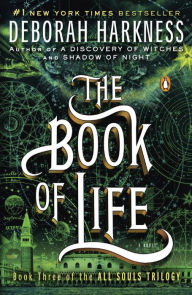 Of the three books in Deborah Harkness’ All Souls Trilogy, this was the book I read the fastest. The final installment in the trilogy—though it’s unlikely to be the last in this universe she has created—The Book of Life deftly weaves together several of the plot threads that almost felt like they’d been dropped through the second book, while still holding tight to the newer plot threads from that second book. Once everything is brought together, the story presses toward a climactic showdown that probably won’t work for everyone but worked well enough for me.
Of the three books in Deborah Harkness’ All Souls Trilogy, this was the book I read the fastest. The final installment in the trilogy—though it’s unlikely to be the last in this universe she has created—The Book of Life deftly weaves together several of the plot threads that almost felt like they’d been dropped through the second book, while still holding tight to the newer plot threads from that second book. Once everything is brought together, the story presses toward a climactic showdown that probably won’t work for everyone but worked well enough for me.
Having returned from the sixteenth century with a better understanding of her powers and what they need to accomplish with regards to the Book of Life, Diana and Matthew must first adjust to the changes that have occurred in the twenty-first century in their absence—including the death of Diana’s aunt, Emily. Vampire customs and the rules of the Congregation’s covenant begin clashing with increasing frequency against the de Clermonts’ expanding family but their biggest problem proves to be a vampire son of Matthew’s who’d been disowned centuries earlier—Benjamin. Obsessed with discovering a way for vampires to reproduce with witches to create a master race, Benjamin has been working at the edges of things longer than anyone realized and is just as determined to find the Book of Life—and gain revenge on his sire by getting his hands on Diana and the twins she is carrying.
A lot of the issues I had with Shadow of Night—namely, the limitations and tediousness of having the majority of the novel in Diana’s first person perspective—are gone with The Book of Life. With further time to reflect on Shadow of Night, I understand better why Diana’s perspective is the only one we really get to see of the sixteenth century—her perspective is most analogous to the readers’ as she is from the twentieth century (though that only makes me wish we had some of Matthew’s point of view since he’s revisiting a period he lived through already and has five hundred years of distance and perspective that would be interesting to explore a little more than we can when we’re stuck seeing everything through Diana’s eyes). Of course, this is all tangential to my initial point which was that I was thrilled to get to see multiple perspectives again.
I’ve heard mixed things about this final book in the trilogy but for myself, I loved it. I have a small suspicion that plot elements laid down in the first book—the European vampire-murders, for example—might have originally had a different outcome intended so the answers at the heart of those questions don’t feel as well developed or clean as other elements of the plot, but, for me at least, they still work as a whole. There was also a lot of world building that took place in this final installment, which lead to smaller confrontations in the buildup to the climax than there had been in the previous books so it could be considered a disappointment for those who enjoyed the “action” of the earlier books. For me, that world building—and the scientific explanations Harkness developed for the different creatures—is one of my favorite things about how this universe and this series are laid out. For those lacking a background or interest in genetics, I’m sure it got tedious. I’m also partial to more controlled conflicts leading up to the big, climactic, trilogy-ending showdown. I do have to say that I expected a little more from the final face-off. I can buy how prepared the characters are but it was too one-sided and over awfully quickly. Switching perspectives through that sequence might have drawn out the tension better (and I’d really have liked to see someone like Ysabeau’s perspective during all of it).